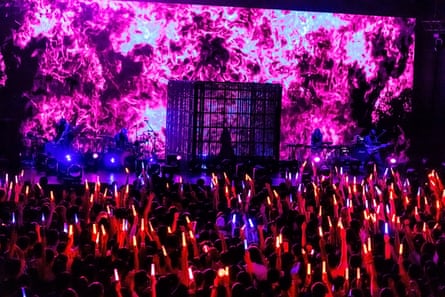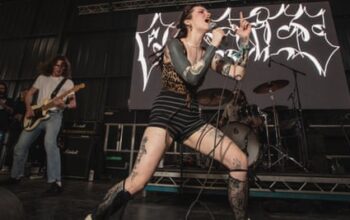A
While strolling through a music store in Taipei, I spotted her newest album showcased prominently. It dawned on me that the staff responsible for the display probably had no knowledge of my presence. However, I have grown accustomed to this sense of anonymity, and it brings me joy.
The famous Japanese pop singer has achieved great success in both east Asia and online. With 10 singles selling platinum and over six million monthly listeners on Spotify, Ado is a superstar. However, her identity remains a secret as she refuses to show her face in photos or videos. Even during a video interview, she keeps her camera off. Ado is known for her captivating conversations and powerful performances, but she is also quite introverted. She shares, “I keep my personal life private, so it was a shock to hear my own voice playing in public places.” Ado is now preparing for her first international tour, including a stop in the UK this month.
As a young artist, Ado released her debut single, titled “Usseewa,” on the day before her 18th birthday in 2020. The song gained immense popularity, with nearly 170 million streams on Spotify to date. The title of the song means “shut up” and features a bold punk beat, lyrics that challenge authority, and Ado’s powerful screams. In a country where conforming to social norms is heavily emphasized, the song struck a chord in Japan and Ado became known as the voice of non-conformist Generation Z. Reflecting on the success of “Usseewa,” Ado explains, “I think the song resonated because it was about anger and was sung by a female vocalist with a raw voice like mine, which was rare at the time.”

Display the image in full screen.
She doesn’t write her songs, but she performs them with relish, hitting notes in over four octaves and bringing lyrics to life with the enthusiasm and dramatic vocal range of an anime voice actor. Indeed, Ado uses an anime-style avatar in lieu of an artist photo and provided the singing voice of a pop-idol character named Uta in the 2022 animated movie One Piece Film: Red (the synthwave-tinged spin-off single from that film, New Genesis, hit No 1 and is her biggest hit to date).
Her musical awakening dates to four or five years old, when she became hooked on Vocaloid music: software with synthetic voices that can be made to sing anything. She cites virtual pop singer Hatsune Miku, an animated avatar of a 16-year-old girl whose voice is brought to life with the technology, and who “performs” as a projection alongside a live band in front of thousands of screaming fans. “When I heard voices such as Hatsune Miku’s for the first time, it felt … not uncomfortable, but unusual,” says Ado. “I wanted to understand what was behind that strangeness. I couldn’t understand whether it was anime or a human being, or who made the music. That air of mystery made me want to learn more.”
She started performing renditions of Vocaloid songs, utilizing the synthetic and mysterious sound of the software to craft her unique persona. She recognized that there were aspects of the songs that only Vocaloids could master, such as rapid delivery and impossible vocal ranges, but she skillfully rearranged them to fit her own human voice. After her bold cover of Syudou’s song “Jama” caught his attention, he proceeded to write and produce “Usseewa” for her. She has since expanded her creative team and used her music to explore the struggle against self-doubt. In “Gira Gira,” she sings of feeling like God used his left hand to create her face, but she later finds strength in not conforming to society’s expectations. In “I’m a Controversy,” she argues that being labeled a “problem child” should be seen as a badge of honor. She expresses a desire to cover a song by Billie Eilish, who also openly shares her struggles with self-worth.
The choice to conceal her face could be interpreted as related to her personal struggles, but in reality it is a deliberate decision to fit in with the Vocaloid community and to highlight her talent as an artist. She explains, “During my live performances, I want to convey the essence of my music through the songs, lighting, and my silhouette. I hope international audiences can appreciate this unique form of culture.”
Ado embodies the characteristics of Japan’s generation Z. This group is more focused on individualism and promoting progressive ideas, in contrast to the previous generation, millennials. They are currently facing the challenges of a constant recession and declining birth rates. Ado expresses that she can sense a shift in the times. She reflects on her childhood hopes for the future and notes that the reality is different, with both positive and negative aspects. As a high school student, she experienced a lot of angst. While she has been fortunate enough to achieve her goals, many young people in Japan are struggling to even identify their ambitions. The uncertain future fills them with worry and even the idea of a typical life feels constricting. This can be seen particularly online, with the abundance of negativity and overwhelming amounts of information.
“I have faith that in the future, individuals will have more chances to lead their desired lifestyles. Although I am still young, I aim to use my music as a guiding light and a source of hope for others.” As artificial intelligence continues to impact job opportunities and give rise to inauthentic pop idols that make Vocaloid singers seem dated, Ado remains steadfast. “There are certain tasks,” she asserts, “that can only be achieved by humans.”
Source: theguardian.com


